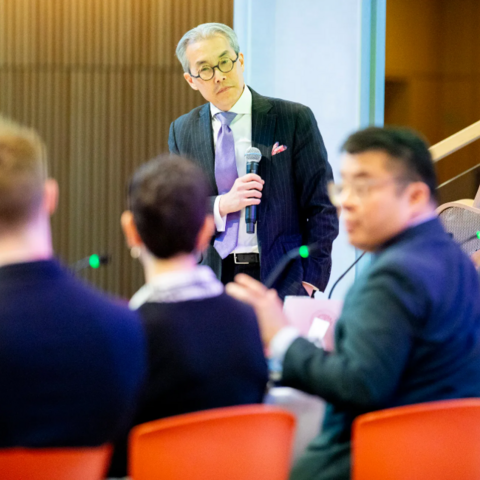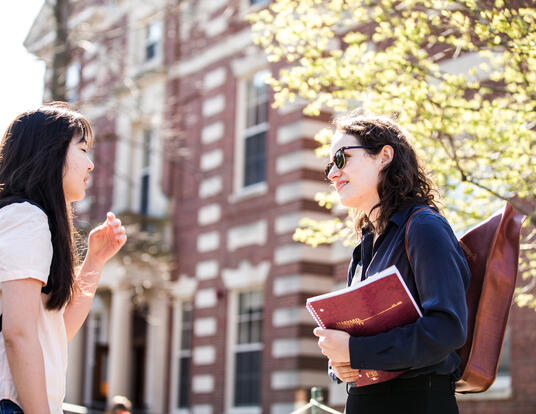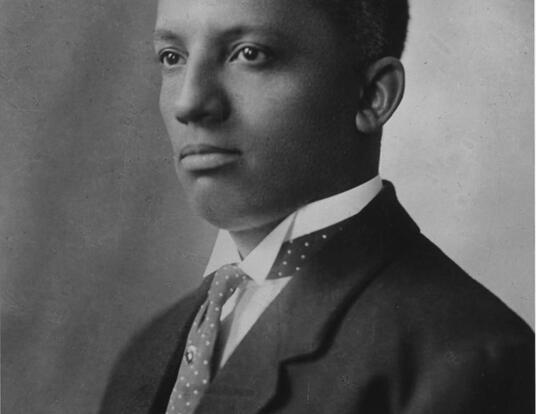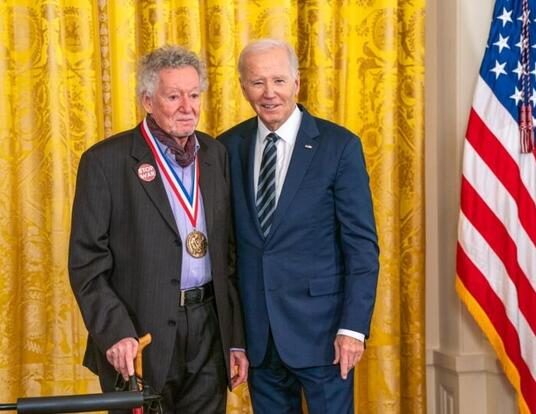Putting Diversity and Inclusion at the Center
Students and staff work to make the GSAS Student Center a place where all feel they belong
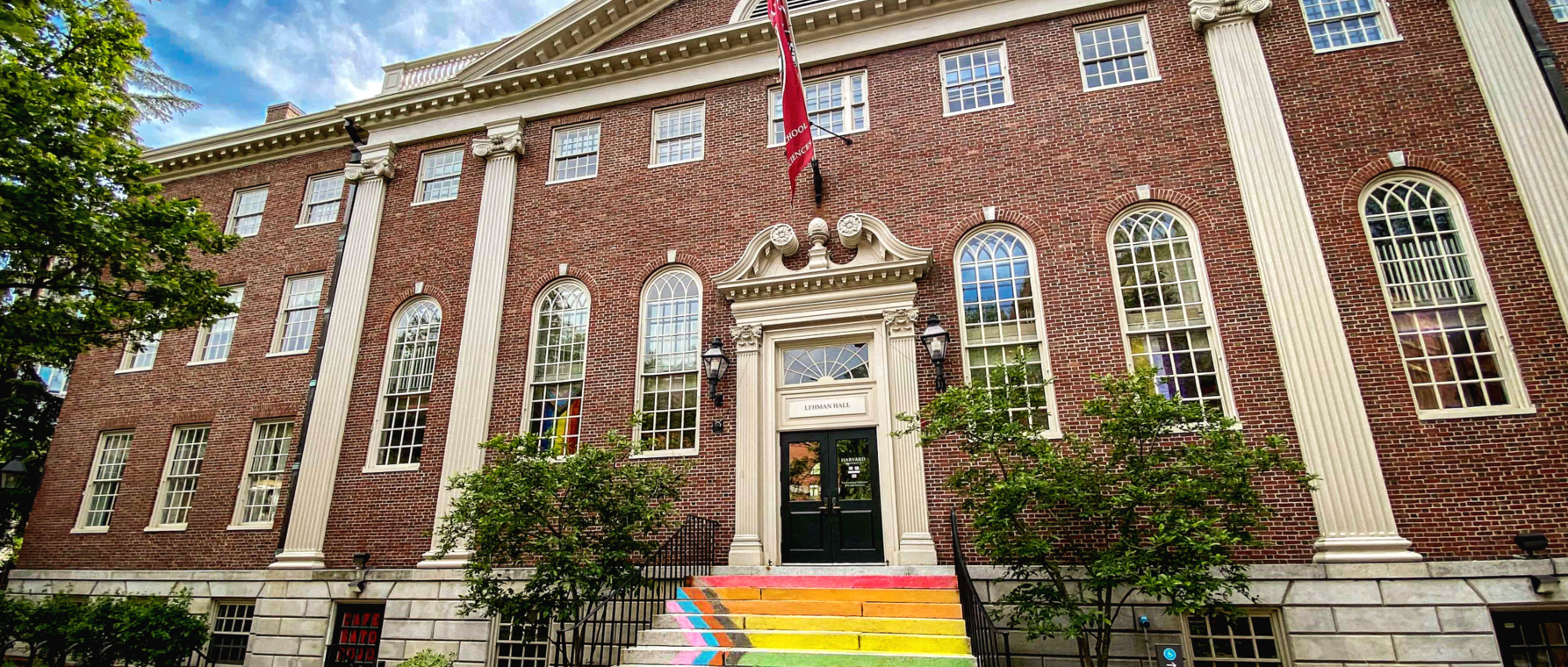
Even as the United States was caught in the grips of COVID-19 in the summer of 2020, the country wrestled with another epidemic as well: racial injustice. The murders of George Floyd, Ahmaud Arbery, and other unarmed people of color reignited the nationwide Movement for Black Lives, which soon spread around the globe. In the weeks and months that followed, long overdue conversations on race and privilege took place across dinner tables and at major institutions—including Harvard’s Graduate School of Arts and Sciences (GSAS).
“These issues aren’t new,” says Dr. Sheila Thomas, dean for academic programs and diversity and leader of the Office of Diversity and Minority Affairs (ODMA). “Students—particularly those involved in GSAS affinity groups—have been trying to address problems of diversity, inclusion, and belonging (DIB) since well before the murder of George Floyd. This moment forced many of us to think about these issues with a renewed focus.”
Last spring, Thomas joined students and staff to bring that focus to the Student Center at Harvard Griffin GSAS. Building on recent work by ODMA and student leaders, the group took a fresh look at the Center’s inclusiveness as a first step to long-term change.
Beyond Statements of Solidarity
Hogle Coordinating Fellow Lindsey Brown and former fellow Sarah Koval were inspired to reach out to affinity groups working on DIB issues. With their input, Brown and Koval co-authored a statement of solidarity with the Movement for Black Lives. The statement reaffirmed the commitment of all Center fellows to diversity and “to learning to become more proactive allies to the Black community, now and after the news coverage ends. Black Lives Matter, and we will work to better our campus and stand with the anti-racist movement to enact change.”
Koval and Brown’s efforts built on those of GSAS groups like the W.E.B. DuBois Graduate Society, GSAS Minority Biomedical Scientists at Harvard, the Harvard LGBTQ@GSAS Association, and the Harvard GSAS Latinx Student Association—as well as ODMA’s own diversity and inclusion fellows—who joined with others across the University in a campaign to “fight against racial injustice and dismantle the structures and mechanisms that harm the Black community and other communities of color.” As part of the Harvard Coalition for Black Lives, these groups challenged the University to match student, faculty, and postdoc donations to activist groups working for racial justice, diversification of mental health services, and establishment of a reporting system for racial discrimination, among many other improvements. They called their campaign #matchmeharvard.
“Students across disciplines and across affinities came together after George Floyd’s murder,” says Karina Gonzalez Herrera, PhD ’16, associate director of diversity and minority affairs at GSAS/Division of Medical Sciences. “ODMA worked with them to provide a space to talk about what had happened. They composed a letter to [Harvard University] President Bacow, asking Harvard to look at itself and think about the ways in which it was contributing to racial injustice. They also kicked off a fundraising effort in support of groups and protestors who were working in the racial justice space.”
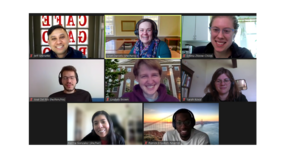
To think about how to move from words to actions, the students, ODMA, and the Center formed the Committee for Diversity, Inclusion, Accessibility, and Belonging. Co-chaired by Thomas and Jacqueline Yun, the Student Center’s executive director, the committee’s charge was to evaluate the organization—including its Lehman Hall space, practices, and programming—and make it more inclusive and accessible to GSAS’s diverse student population.
“The GSAS discussion built on previous conversations with ODMA on ways affinity group student leaders and graduate student fellows could collaborate to increase diversity, inclusion, and belonging at the Center,” says Yun. “We wanted to have some honest discussions about how we’ve operated in the past, to acknowledge where we’ve fallen short, and to explore ways we could improve.”
The Student Center group met on Zoom throughout the 2021 spring term to identify clear, actionable steps toward long-term change. Its exhaustive review included the way the Center recruited, trained, and supported its fellows; programming and events; physical and digital accessibility; visual culture and signage. Jeff Shenette, a senior program coordinator at the Student Center, says that difficult discussions were possible thanks to the trust he and his colleagues shared.
“The committee was a space where people could be open and honest,” he says. ”Dean Thomas, [ODMA Diversity and Inclusion Fellow] José [Del Río Pantoja], and the Center fellows and staff critically evaluated our past programming and gave feedback. It is very gratifying to have those kinds of conversations and come together to identify ways to make progress.”
Our students are done waiting for change. They demand it. They deserve it.
-Dr. Sheila Thomas
Change Now, Change to Come
The committee welcomed guest speakers and new members who addressed topics critical to improving DIB at the Student Center. Michele Clopper, director of University disability resources, and Janell Sims, digital accessibility consultant, reviewed the accessibility of the Center’s physical and online spaces. Alexis Turner, president of the GSAS Student Council (GSC) and a member of the FAS Task Force on Visual Culture and Signage joined the committee to discuss how best to collect feedback and make the art, furnishings, and wayfinding of Lehman Hall more inclusive and welcoming.
The committee agreed that to offer support and programming that is truly accessible to all members of the GSAS community, the Center’s fellows should reflect the School’s diverse student body. To that end, the group considered recruitment and hiring practices, drawing on conversations and innovations from recent years. As a result, the training for new Student Center fellows will now cover issues of race and social and cultural background.
“We’re drawing on the Community and Culture workshop developed and led by ODMA’s DIB fellows and students in the biological and biomedical sciences program,” Yun explains. “We ask the Center fellows to reflect on the communities they serve and on their own identities as they embark on their leadership journey.”
One of the bright spots of the School’s efforts to mitigate the impact of the coronavirus was the Center’s outreach to students off campus. Using the Engage website as home base for Zoom and other online platforms, Center fellows strived to create programming which reached beyond Harvard—often with speakers and instructors from across the globe offering programs that appealed to a wide range of regions and populations.
“Engage was launched in March 2020, just as the pandemic was expanding,” says Senior Program Coordinator Janet Daniels. “It enabled leaders to hold events and run programs that created community at the School, even as the student body was geographically dispersed. As a result, we had a huge number of virtual events and were able to include students not only from the Greater Boston area but also from many different US states and countries. We plan to carry these programs on post-COVID to bring the Center’s offerings to a larger and more diverse population.”
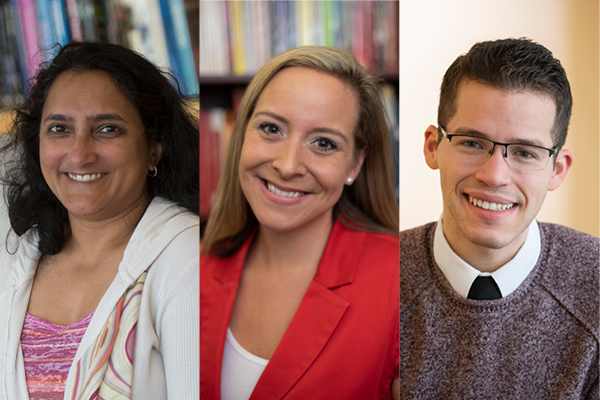
Throughout the spring, committee members shared updates with—and gathered feedback from—the Student Center Fellows team. Yun says that the committee’s work is important for the future of DIB throughout GSAS because the Center’s reach extends far beyond the walls of Lehman Hall, its campus home.
“At the end of the day, the Center is a concept,” she says, “one that serves to bring together all GSAS students, irrespective of where they are physically located.”
Committee members appreciated the opportunity to come together and address critical DIB concerns. They look forward to continuing this work in academic year 2021-2022, likely in the form of smaller subcommittees that target specific issues or changes at the Center. Del Río Pantoja, says the group made him feel hopeful about diversity and inclusion at Harvard.
“While a lot of diversity and inclusion work often feels decentralized at—and unsupported by—Harvard University, [the Student Center effort] feels different,” he says. “We were not only asked for feedback and heard by leadership, but we also saw action plans emerge from our DIB-focused conversations almost immediately. I'm excited for the future of the Student Center's programming, structures, and practices.”
Thomas says that action is exactly what’s needed. And now.
"Inclusiveness at the Student Center—and at GSAS as a whole—has long been a priority for students of color, LGBTQ folks, and others,” she says. “It's encouraging that the Center is participating in this conversation and has taken some steps to make itself more welcoming, but there's a lot more work to do. Our students are done waiting for change. They demand it. They deserve it. ODMA will continue to partner with both them and the Student Center to make sure it happens."
Support the Student Center at Harvard Griffin GSAS’s DIAB work! Send your feedback, thoughts, and ideas to stucenter@fas.harvard.edu.
Banner photo by Janet Daniels; Portraits by Tony Rinaldo
Get the Latest Updates
Join Our Newsletter
Subscribe to Colloquy Podcast
Simplecast


